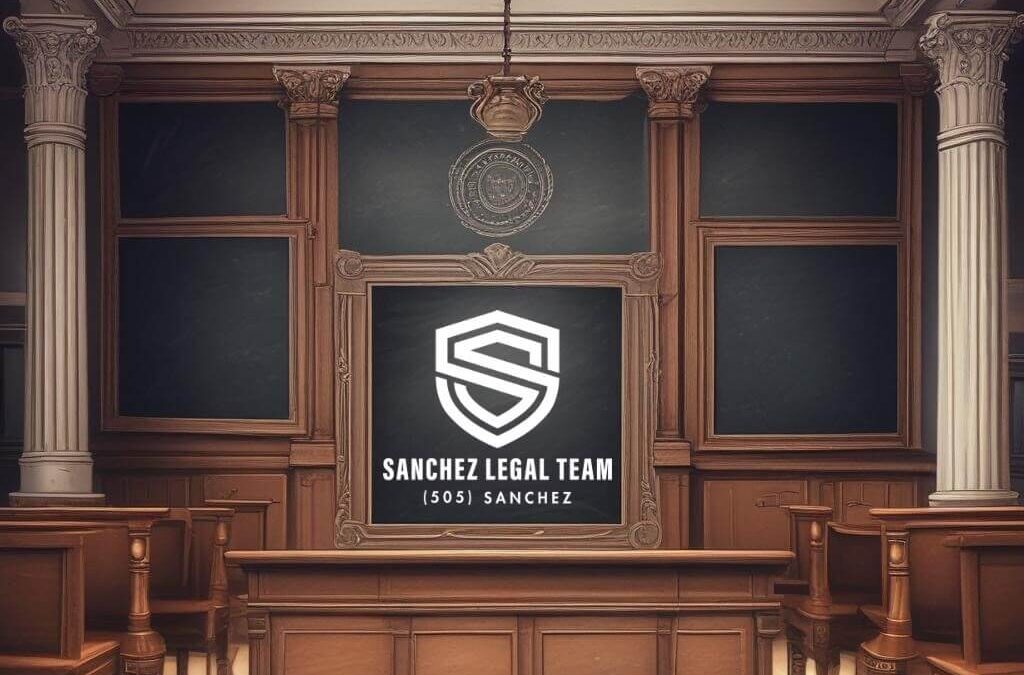In Albuquerque, the safety and well-being of you and your children should always be a top priority. One crucial step in ensuring your protection is getting an order of protection. This legal document serves as a safeguard against potential harm or threats from an individual, providing you with immediate legal protection.
With an order of protection, you and your children can have peace of mind knowing that there are legal measures in place to protect you from any form of abuse or harassment. Whether you’re dealing with domestic violence, stalking, or any act of abuse, an order of protection empowers you to take control of your safety.
Sanchez Legal Team understands the importance of feeling secure. That’s why we are dedicated to guiding you through the process of obtaining an order of protection in Albuquerque, New Mexico. Our experienced team of professionals can provide the necessary legal guidance.
Take the first step towards protecting yourself and your children. Call (505) SANCHEZ and speak with one of Albuquerque’s best restraining order of protection attorneys in New Mexico.
WHAT IS AN ORDER OF PROTECTION IN ALBUQUERQUE, NM?
An order of protection, also known as a restraining order, is a legal document issued by a court that stops abuse. An order of protection serves as a crucial tool to safeguard victims and their children from further harm or harassment.
This court-ordered directive legally restricts the abuser’s ability to contact, communicate with, or come near the victim. In doing so, the protective order provides a legal framework to hold the abuser accountable for any violations.
The purpose of an order of protection is to create a safe and secure environment for the victim and their family. It allows the victim to take legal action if the abuser attempts to make contact or engage in any threatening behavior.
An order of protection can be granted when the abuser is a household/family member, or an intimate personal relationship. The order of protection empowers the victim to take control of their safety and seek justice through the legal system.
Getting an order of protection is a significant step in addressing domestic violence and ensuring the well-being of the victim and their children. It serves as a deterrent to the abuser, demonstrating that the victim has the full support and protection New Mexico law. By taking this legal action, the victim can regain a sense of security and take the necessary steps to rebuild their life free from the fear and control of the abuser.
UNDERSTANDING THE LEGAL BASIS FOR AN ORDER OF PROTECTION
In Albuquerque, the legal basis for obtaining an order of protection is rooted in the New Mexico Family Violence Protection Act. This Act outlines the specific criteria and requirements for individuals to seek and obtain a court-ordered protective measure.
Under the Family Violence Protection Act, any act of abuse can be the basis for getting a restraining order. In this regard, abuse covers a wide range of activities. These include physical or sexual abuse, stalking, harassment, or damage to property. Also, severe emotional distress is considered abuse under the Act.
The Family Violence Protection Act empowers victims to file an order of protection in the district court in their county. So, people living in Albuquerque would request an order of protection from the Second Judicial District Courthouse. In Rio Rancho, victims can request an order of protection through the Thirteenth Judicial District Courthouse.
The court will then evaluate the evidence and determine whether the criteria for issuing an order of protection have been met. This evaluation typically includes an assessment of the threat of immediate danger, the history of abuse, and the potential for continued violence or harassment.
When an order of protection is granted, it carries the full force of the law. Violating the terms of the order can result in criminal charges and potential incarceration for the abuser. This legal framework serves as a powerful deterrent. In doing so, the order demonstrates to the abuser that their actions will not be tolerated and that there are serious consequences for any attempts to contact, harass, or harm the victim.
HOW AN ORDER OF PROTECTION CAN PROTECT YOU AND YOUR CHILDREN
An order of protection is a critical tool in safeguarding the safety and well-being of victims of domestic violence. In New Mexico, this protection applies to children as well. By obtaining a protective order, individuals can take proactive steps to protect themselves and their families from further harm or harassment.
One of the primary benefits of an order of protection is that it provides a clear and legally binding directive for the abuser to cease all contact with the victim. This includes prohibiting the abuser from attempting to communicate, approach, or come near the victim’s home, workplace, or any other location where the victim may be present.
This separation can be particularly important in cases where the victim and abuser have a shared living arrangement or children in common. You see, the protective order creates a legally enforceable barrier to prevent further abuse.
Are children involved with your restraining order of protection in New Mexico? If so, an order of protection can also grant temporary custody of any minor children to the victim. In New Mexico, a protective order involving children can decide custody and timesharing for six months.
The order of protections temporary custody provision can be crucial in safeguarding the well-being and stability of the children.
Finally, the order of protection can also require the abuser to provide child support. This support further protects the victim and their family from the economic consequences of the abuse.
Check out this video to better understand restraining orders involving children in Albuquerque, New Mexico.
THE PROCESS OF OBTAINING AN ORDER OF PROTECTION IN ALBUQUERQUE, NM
In Albuquerque, the process of obtaining an order of protection involves several steps to ensure that the victim’s safety and rights are fully protected. The first step is to file a petition for order of protection with the appropriate court. In Los Lunas/Belen you would file with the Valencia County Courthouse.
The petition must include detailed information about the abuse or threats that the victim has experienced. Also, the petition can list any relevant evidence, such as police reports, medical records, or witness statements.
The court will then reviews the petition. When finds probable cause to believe that an act of abuse occurred, a temporary restraining order of protection is issued. This temporary restraining order prevents contact and sets a hearing date.
During the hearing, the victim will have the opportunity to present their case and provide testimony about the abuse or threats they have experienced. The abuser may also be present and given the chance to respond to the allegations. After carefully considering the evidence and arguments presented, the court will decide on whether to issue the order of protection.
If the order is granted, it will typically be in effect for one year. The order will outline the specific terms and conditions that the abuser must follow. These restrictions can include contact, communication, or proximity to the victim and their children.
In New Mexico, violating the restraining order can result in criminal charges and potential incarceration for the abuser.
TYPES OF PROTECTIONS INCLUDED IN AN ORDER OF PROTECTION
An order of protection in Albuquerque can provide a comprehensive range of protections for the victim and their children. Some of the key provisions that may be included in the order include:
No-contact order: This prohibits the abuser from contacting the victim, either directly or indirectly, through any means of communication, including phone, text, email, or social media.
Stay-away order: This requires the abuser to maintain a specified distance from the victim’s home, workplace, or any other location where the victim may be present. This includes the children’s school or daycare.
Temporary child custody and support: The order can grant the victim temporary custody of any minor children and require the abuser to provide financial support for the children’s care and well-being.
Property protection: The order may include provisions to prevent the abuser from accessing or damaging the victim’s personal property, such as their home, vehicle, or other belongings.
Firearm restrictions: In New Mexico, an order of protection prevents the abuser from purchasing or possessing a firearm while the order is effective.
Counseling or treatment requirements: The court may order the abuser to participate in counseling, anger management, or other rehabilitation programs as a condition of the order.
These comprehensive protections are designed to create a safe and secure environment for the victim and their children. In doing so, the protective order also holds the abuser accountable for any violations of the order.
VIOLATIONS OF AN ORDER OF PROTECTION AND THE CONSEQUENCES
When an order of protection is in place, it is crucial that the abuser strictly adheres to the terms and conditions outlined in the court-issued document. Violating the order can have serious legal consequences, both for the safety of the victim and the abuser themselves.
In Albuquerque, any violation of an order of protection is considered a criminal offense. This means that if the abuser attempts to contact the victim, comes near the victim’s home or workplace, or engages in any other prohibited behavior, they can be arrested and charged with a crime. The penalties for violating an order of protection can include fines or jail time.
It is important for victims to understand that they have the full support of the legal system in enforcing the order of protection. If the abuser violates the order, the victim should immediately report the incident to the police. The authorities will then investigate the violation and take the necessary legal actions to hold the abuser accountable. This prompt reporting and enforcement of the order can be crucial in preventing further harm and ensuring the victim’s continued safety.
WORKING WITH AN ALBUQUERQUE LAWYER TO GET AN ORDER OF PROTECTION IN NEW MEXICO
It is possible to obtain an order of protection without legal representation. However, working with an experienced attorney can significantly improve the chances of success. At Sanchez Legal Team, our team of legal professionals excel at order of protection cases that involve children across New Mexico. Our top-rated restraining order lawyers routinely handle divorce and custody cases that include restraining orders.
Our attorneys understand the complexities of the legal system. We understand how a divorce and custody case can intersect and influence a restraining order matter. So, we can assist in gathering and presenting the necessary evidence, crafting a compelling case for the order of protection, and advocating for the most comprehensive protections possible.
By working with a lawyer, victims can feel empowered and supported throughout the process of obtaining an order of protection. Our team at Sanchez Legal Team is committed to providing the best legal representation for victims of abuse.
Also, our team routinely represents people that have been falsely accused of abuse. You see, not all allegations are legit. At times, parents use the domestic violence courts to achieve leverage in a custody or divorce case.
So, whether you are a victim of abuse or falsely accused, our team of restraining order lawyers can help.
Have you been falsely accused of abuse and are facing a restraining order in New Mexico? If so, this video helps you understand how to fight against false allegations of abuse.
COMMON MISCONCEPTIONS ABOUT PROTECTIVE ORDERS IN NEW MEXICO
Despite the critical importance of orders of protection in safeguarding victims of domestic violence, there are still several common misconceptions. It is essential to address these misconceptions and provide accurate information.
One common misconception is that an order of protection is only applicable in cases of physical abuse. Orders of protection can be obtained for a wide range of abusive behaviors, including emotional, psychological, and damage to property. Victims of stalking, harassment, or threats of violence can also qualify for an order of protection.
Another misconception is that obtaining an order of protection is a complex and time-consuming process. While the legal proceedings can be daunting, our experienced legal team can guide victims through the process.
Call (505) SANCHEZ today and talk with an attorney that understands how divorce, child custody, and restraining orders intertwine.
TAKING ACTION TO PROTECT YOURSELF AND YOUR CHILDREN IN ALBUQUERQUE, NM
In Albuquerque, the safety and well-being of you and your children should always be the top priority. An order of protection is a crucial legal tool that can provide immediate and comprehensive protection. Protective orders guard against domestic violence, stalking, and other forms of abuse. By taking the necessary steps to obtain an order of protection, you can regain a sense of security and take control of your life.
Sanchez Legal Team understands the challenges and complexities that victims of domestic violence face. So, we provide top-shelf support and guidance during this stressful period in your life. Our team of top Albuquerque restraining order attorneys can assist you in every step of the process.
Remember, you are not alone. By acting and obtaining an order of protection, you can take the first crucial step towards a safer and more secure future.
Call (505) SANCHEZ today and talk with one of New Mexico’s best restraining order of protection attorneys. Our team exceeds expectations with uncontested divorces across New Mexico. We excel at child custody, kinship guardianship matters involving allegations of family violence.










